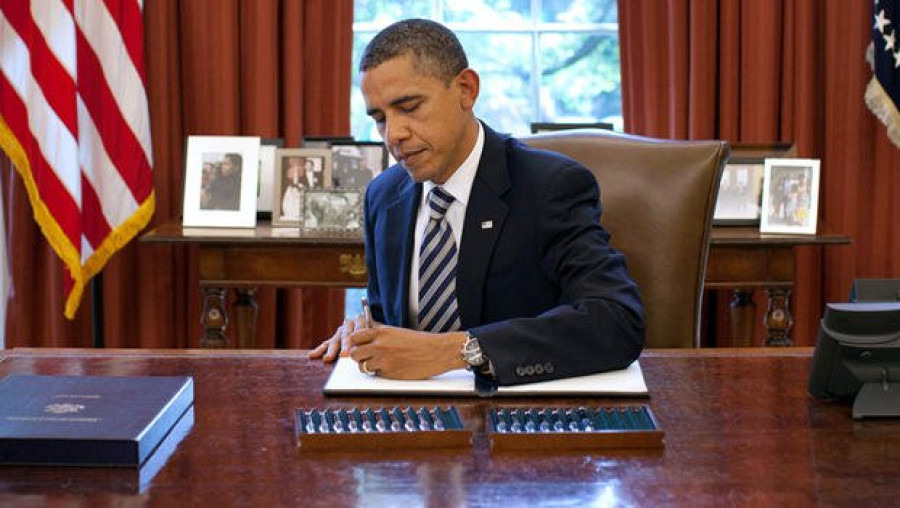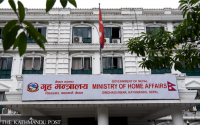National
Nepali garments get duty-free status in US
Nepali readymade garment has officially received duty-free facility in the US market, with the US President Barack Obama signing legislation authorising special trade preferences for Nepal on Wednesday.
Nepali readymade garment has officially received duty-free facility in the US market, with the US President Barack Obama signing legislation authorising special trade preferences for Nepal on Wednesday.
The special trade preference now allows duty-free tariff benefits for up to 66 types of garment items including certain carpets, headgears, shawls, scarves and travel goods. The authorisation of Nepal Programme has addressed the demand of Nepali garment manufacturers who had been lobbying for duty-free entry for Nepali products for over a decade.
With the authorisation, Nepali exports will enjoy duty-free tariff benefits which are currently not eligible under General System of Preferences (GSP), the largest and oldest US trade preference programme that provides duty-free facility in the US market.
According to the US government, the Nepal programme is authorised for 10 years and designed to help Nepal’s economic recovery from the April and May earthquakes.
“The Nepal Trade Preferences Legislation also outlines a trade capacity building programme, focusing on helping Nepal implement the World Trade Organisation’s Trade Facilitation Agreement (TFA),” reads a press statement issued by US Embassy.
US Ambassador to Nepal Alaina B Teplitz termed the development a tremendous opportunity for Nepali business to expand imports to the US markets. “We look forward to learning more about Nepal’s plans for implementing the TFA and how the United States government can contribute to this goal,” said Teplitz. Nepali garment manufacturers have welcomed the US government move, saying that it will provide an opportunity to revive the industry.
Garments Association of Nepal (GAN) President Chandi Raj Aryal said the Nepali garments will now be competitive in the US market that accounted over 80 percent of Nepal’s total garment exports during the heydays. The US has been imposing an average of 16-17 percent duty on Nepali garment.
For Nepali garment industry, the US is the major market. In 2000-01, Nepal’s garment exports reached an all-time high of Rs13.12 billion, with exports to the US accounting for 86.49 percent.
However, Nepal’s garment industry witnessed a prolonged slump after the US scrapped the quota system in 2005 as per the agreement on Textiles and Clothing (ATC) of the WTO. The garment exports slumped to Rs5.28 billion in 2014-15 and number of garment industries came down to around 50 from over 400 in 2000-01.
According to Aryal, GAN has started homework to improve production capacity of domestic garment industry. “We need the government cooperation if we are to reap maximum benefits,” he added.
GAN has sought government support to address the problems such as shortage of skilled manpower, power outage, transit problems while exporting through India and labour issues along with facilitating soft loan.
“The duty-free facility to the US market is welcome, but many other issues need to be resolved if Nepali ready-made garment industry wants to reclaim the lost glory,” said a leading garment manufacturer. Trade expert Posh Raj Pandey, however, dropped a word of caution. According to him, only 40 percent of the Nepali garments being exported to the US could be eligible for receiving the GSP. “Failing to meet the requirement, the rest 60 percent could be excluded from the facility,” said Pandey, stressing on the need for a thorough study of clauses involved in the approved bill.
According to Pandey, the approved bill included many clauses in reference to African Growth and Opportunity Agreement. “Likewise, it also talks about the American security aspects while exporting the garments to the US,” said Pandey, adding that Nepali exporters should meet all the conditions to reap maximum benefit.
According to the US Embassy, for the new trade preference programme to come into effect, certain administrative steps need to be completed in the US.
First, the President must certify that Nepal meets the eligibility requirements of the programme, which are the same as those for African Growth and Opportunity Act countries. The US is also required to request a review by the US International Trade Commission of the products covered by the preference programme to ensure that an increase in imports of these products into the US market will not negatively affect the US economy. “These statutorily-required reviews will take several months to complete, but the United States intends to complete the process as soon as possible,” stated the press release issued by US Embassy.




 9.93°C Kathmandu
9.93°C Kathmandu













